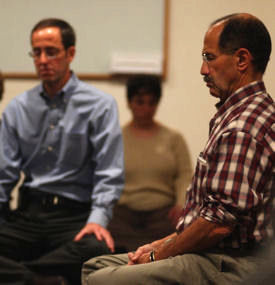Examining ethical dilemmas that occur in everyday practice
A Harvard expert moderates a new column on ethical case studies and suggests some practical strategies for handling and preventing conflicts. Case study: How should a physician react when an elderly patient refuses life-saving treatment contrary to the wishes of her family?.
This column is the first in a series of ethical case studies designed to educate, but even more importantly, to engage ACP members in reflecting on the ethical aspects of our work as physicians. Each issue will include a case taken from actual clinical experience. The dilemmas presented are based on situations that are likely to arise in everyday practice, rather than “ethical zebras” or rare “fascinomas.”

The expert commentary accompanying each case will address three fundamental questions:
- What are the specifically ethical questions posed by the case?
- What is the best way to analyze those issues in this and similar cases?
- What are some recommended specific, practical strategies for handling the case?
The underlying philosophy of this column will be that the ethics or ethical wisdom of the College does not reside with any subgroup or even those acknowledged as prominent ethicists. Rather, the true ethics of the College are exactly the sum of all of the wisdom, virtues, decisions and actions of its members.
Each month's commentary will be, however, just the beginning of the discussion. Readers will be encouraged to e-mail their comments or questions about the case and commentary, selections of which will be included in subsequent issues of ACP Internist. We may eventually add an ethics blog, allowing more real-time discussions among ACP members.
Three principles
A few basic principles likely will recur in the commentaries.
1) Ethics extends far beyond obligations.
When ethics makes the news, it is usually because someone (often in business or government) has broken a rule. Fulfilling obligations is of course important in clinical ethics. But for thousands of years, in both philosophical and religious traditions, moral excellence has meant much more. Our moral heroes of the last century, including Mahatma Gandhi, Albert Schweitzer, and Nelson Mandela, went far beyond what anyone would have said was required of them.
2) A methodical reasoning process can help us resolve ethical disagreements and reach ethically sound conclusions.
We will sometimes apply part or all of a five-step framework for thinking through an ethical decision:
- What are the facts?
- What values appear to be in conflict?
- What are the possible courses of action?
- Which course of action will best promote the value(s)—if possible all of them—that physicians are most responsible for?
- Could something have been done differently at an earlier stage that would have prevented the ethical problem, or made it easier to resolve (preventive ethics)?
This framework can provide a useful differential diagnosis of ethical disagreement that can facilitate resolution. For example, if I and a colleague, patient or family member disagree about what to do, resolving that issue rationally requires us to distinguish between our differences about the facts, including diagnosis and prognosis, and disagreements about values (for example, whether life in a particular condition is worth living).
3) Ethical work is rewarding.
In his landmark studies of good work in the professions and of the social forces that today support or undermine it, Howard Gardner proposes three ways in which good work is good: It is skilled; it is morally good; and it is satisfying. These are interconnected and mutually reinforcing.
Applying hard-won skills to doing something good for a patient is deeply rewarding for any physician. There are few things as literally demoralizing for physicians as the sense that the work we are doing is not good, and few things as energizing as the joy of skillfully caring for patients in ways that make us morally and professionally proud. If this column can, even in a small way, become a forum that helps us support each other in doing good work, it will be a success.
Lachlan Forrow, FACP, is director of the Ethics Support Service at Beth Israel Deaconess Medical Center in Boston and associate professor of medicine at Harvard Medical School.
Case study: Elderly woman refuses lifesaving treatment
A 78-year-old woman has a long history of hypertension and type 2 diabetes with inconsistent adherence to her medical regimen and early Alzheimer's-type dementia. She has developed steadily progressive renal failure and is now admitted with volume overload, marked peripheral edema and congestive heart failure refractory to medical treatment. Despite extensive discussions explaining the need for dialysis, she refuses, saying that while she wants to live she does not believe that she needs it. Her deeply involved children plead with you, “Can't you force her?”
Commentary
In the framework of the ethics work-up, the central values in conflict are respect for the patient's right to self-determination (her autonomy) and our responsibility for the patient's medical well-being, including averting a preventable death (beneficence).
Cases such as the above often trigger a request to the psychiatry department for a competency assessment, with the assumption that if the patient is found to be competent then her refusal must be respected (autonomy trumps beneficence). A competent patient has the right to refuse any treatment, even one necessary to save the patient's life. Alternatively, if the patient is found to lack decision-making capacity then guardianship will be sought. If the guardian determines through an appropriate substituted judgment that the patient would agree to dialysis if she were competent, then people involved expect that the guardian will authorize dialysis.
In my experience, it is never so simple. The appropriate substituted judgment question is more complicated than “Would she want dialysis if competent?” The guardian's substituted judgment instead should be along the lines of, “If she were competent she would direct us to ‘dialyze me even if during a period of incompetence I am refusing.’”A guardian who understands this may decide that it would be wrong to support dialysis being done against the (incompetent) patient's will.
But even if a guardian authorizes dialysis, it is unlikely that a dialysis team would conclude that chronic dialysis of a resisting patient can be safely implemented. (Acute, very-short-term dialysis may be different.)
The central issue from a practical standpoint then becomes, “Can we find a way to get this patient to agree to dialysis, or, if not deemed competent, at least not actively resist?” This is a path that supports both respect for her autonomy and her welfare.
In this case, I would turn back to the children and ask them if they really believed that their mother would agree to the dialysis if she fully understood. If they still feel that she should receive the treatment, the family and medical team must find some way to persuade the patient to go along with dialysis. Pressuring the patient usually just stiffens resistance. Instead, the family and team should sympathetically address her hesitations and hope that loving encouragement from family, possibly reinforced by worsening symptoms, will prevail before it is too late.
Finally, from a preventive ethics perspective, this case highlights the importance of having early conversations with patients and families about foreseeable future ethical dilemmas. That this patient might one day need dialysis was predictable, so it would have been enormously helpful if the patient and family had had conversations early on while the woman's decision-making was unquestionably intact.
Follow-up:
The family failed to convince the patient to accept dialysis and she was discharged home. She soon developed distressing dyspnea from fluid overload, and at six months follow-up was continuing to agree to intermittent outpatient dialysis.
E-mail us your comments on this case and commentary.




